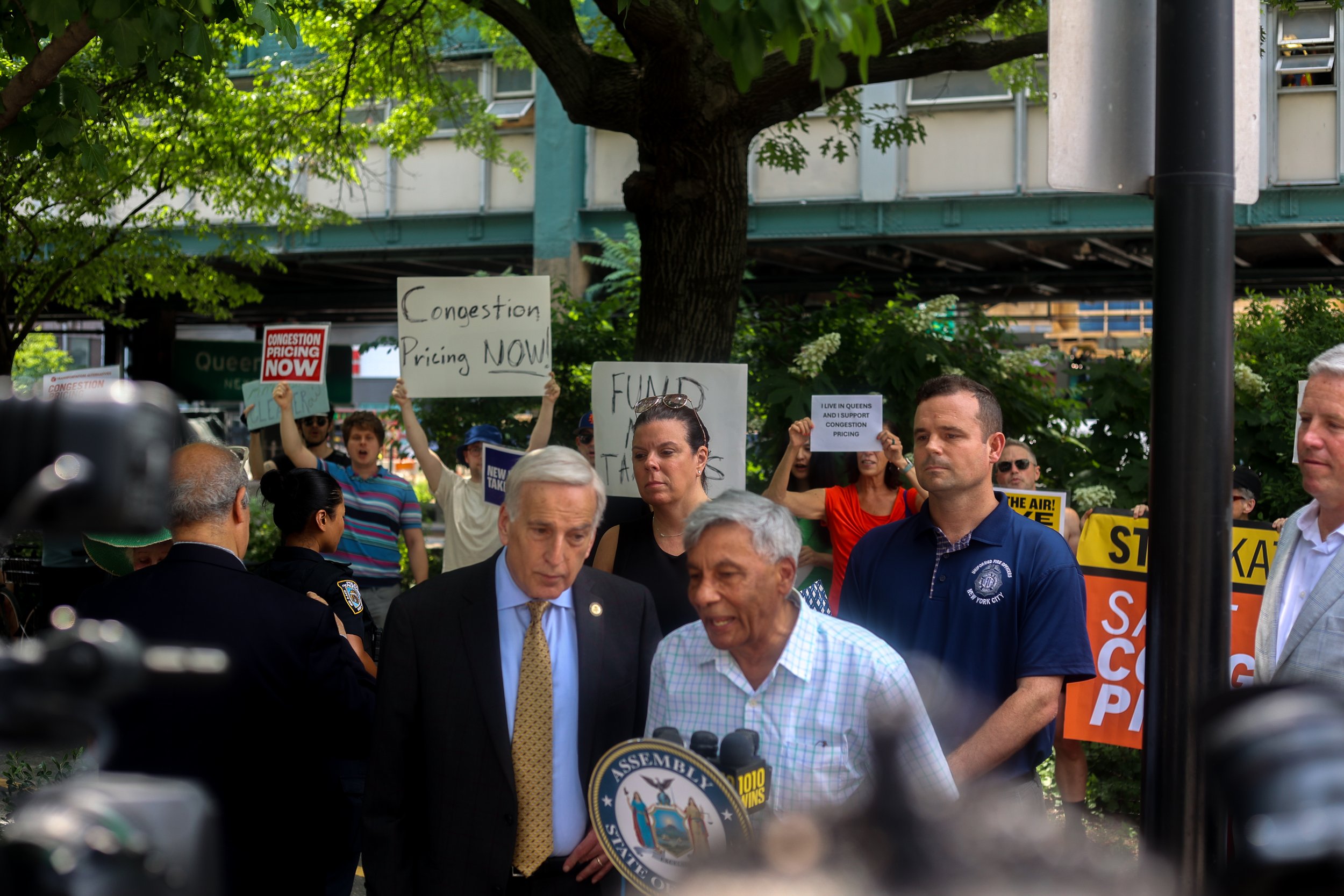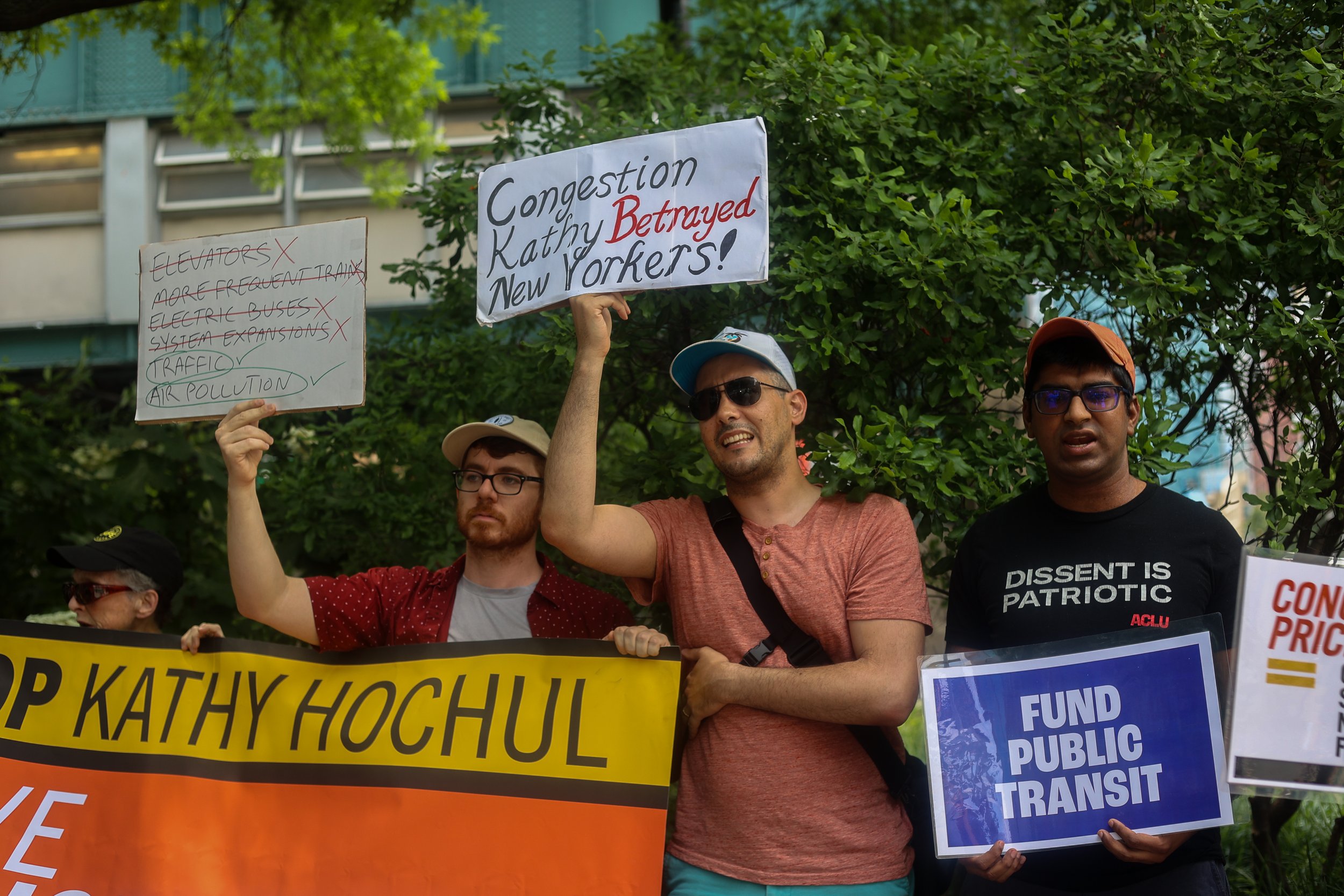Congestion pricing debate comes to a head at foot of Queensborough Bridge
/Queens Assemblymember David Weprin held a rally in support of Governor Kathy Hochul’s congestion pricing reversal, but the press conference was often drowned out by locals protesting in favor of congestion pricing. Eagle photo by Ryan Schwach
By Ryan Schwach
The fight over Governor Kathy Hochul’s congestion pricing pause came to a head at the foot of the Queensborough Bridge on Friday as a local Queens pol who has long been opposed to the now-delayed toll sparred with transit advocates and prevented a local city councilmember supportive of congestion pricing from making remarks to the press.
Though Eastern Queens Assemblymember David Weprin called the press conference for the westernmost corner of Queens in an effort to celebrate the indefinite pause on congestion pricing, much like the effort to implement the toll by the end of June, things didn’t exactly go as planned.
On Friday afternoon, Weprin doubled down on his support of Hochul’s pause at the foot of the Queensborough Bridge in Long Island City, a highly trafficked area of the borough deep in what could be considered pro-congestion pricing territory.
“I'm pleased by Governor Hochul's decision,” Weprin said. “[I] hope it will go further.”
“I see the governor's decision as a pragmatic response to increasing public concerns and concerns that I and many others have raised for many years,” he added.
Weprin has long argued against congestion pricing, claiming that it would unfairly impose a financial burden on communities like the ones in his district who lack public transportation options.
“Many of my constituents have no viable transportation options other than driving a car,” he said.
However, most of Weprin’s arguments were drowned out by chants of “safer streets, cleaner air, David Weprin doesn’t care” and “congestion pricing now” from a chorus of transportation advocates who had positioned themselves directly behind Weprin’s rally.
In the background of the entire back-and-forth was the slow-moving traffic making its way to and from the bridge.
“I'm here because congestion on our streets is incredible,” said Sunnyside resident Joe LoBello. “It's a big issue for our communities.”
Other protestors included organizers from Families for Safe Streets and Transportation Alternatives like Queens attorney Peter Beadle, who often represents pedestrians and cyclists injured by cars.
Protestors at the foot of the Queensborough Bridge at times drowned out Assemblymember Weprin’s rally, calling for congestion pricing to be reinstated. Eagle photo by Ryan Schwach
On Friday, he said he hopes that congestion pricing might actually lead to him having less clients.
Beadle slammed the governor’s decision to pause the program weeks before it was to begin and after having spent around half a billion dollars on it “absurd.”
On Friday, he called Weprin’s location choice for the press conference ironic, largely because of the large amount of traffic that often congests the onramp to the Queensborough Bridge, a free overpass directly into midtown Manhattan.
“We're standing right now in one of the most congested parts of Queens, and that's because it's immediately adjacent to Manhattan…it's congested all the way to Northern Boulevard, it gets congested down Van Dam, down to LaGuardia Community College, which has historically had a huge problem, has had several people hit, even killed,” said Beadle. “All that congestion stems from the free invitation to come over this free bridge into Manhattan. With congestion pricing, the toll shopping will decrease.”
Beadle, a Rego Park resident who says he owns a car, said that the choice of location shows how “out of touch the assemblymember is.”
“If he truly understood why this neighborhood is so congested and why congestion pricing actually does matter to Queens, especially Western Queens, I think at a minimum, he wouldn't hold a press conference here,” he said.
It’s not the first time Weprin has lambasted congestion pricing from the foot of the bridge. He defended his choice of location when asked about it on Friday, saying that it was important to highlight the need for a free option to get into the city.
“The unlimited free transportation over the bridge from here, the Queensborough Bridge, will no longer be an option if congestion pricing is in place,” Weprin said. “There'll be that congestion fee regardless of going over the bridge, so that it's not a free alternative to getting into Manhattan.”
Weprin called the protestors “not civil people,” when asked about them by reporters.
“You can tell by the way they are behaving,” he said.
Just as the rally was beginning to wrap up, the local councilmember for Long Island City, Julie Won, arrived and went up to the podium. She was initially welcomed by Weprin.
However, Weprin quickly realized the generally progressive elected was there to defend congestion pricing, not condemn it, and promptly ended the press conference and rescinded his invitation for Won to speak.
Towards the end of the rally, Assemblymember David Weprin exchanged words with City Councilmember Julie Won, who came to speak in favor of congestion pricing. Eagle photo by Ryan Schwach
The two exchanged words, which could not be heard by reporters as protestors shouted, “let Julie speak” in the background.
“It took more than 13 years of work and organizing to ensure that we have congestion pricing in place, we are now in a $15 billion hole for the MTA,” Won said to reporters immediately following the end of the conference. “Especially in a district like mine, where we have the highest number of non-drivers, more than 80 percent of them do not own a vehicle. We deserve to have a say in how our taxpayer dollars are collected and spent, and it is not okay for one person to unanimously work to undo everybody's work.”
“We do not want Governor Hochul using congestion pricing as a political bargaining chip,” Won added. “This is not okay, these are real people's lives, these are real people's commutes.”
During the conference, Weprin spoke in support of the $1 billion in funding the state legislature attempted to allocate to the MTA in lieu of congestion pricing, and said that he thinks “other revenue streams” can be found to help fund the MTA, who have said they may have to put and end to a slew of capital improvements they expected would be paid for through congestion pricing.
“I'd like to see the improvements in elevators and other things, I have not done it yet fully, but that would be part of the capital plan, once we find that revenue, which I'm optimistic we'll find sometime this year, early next year,” Weprin said. “Certainly, we need revenue streams.”






